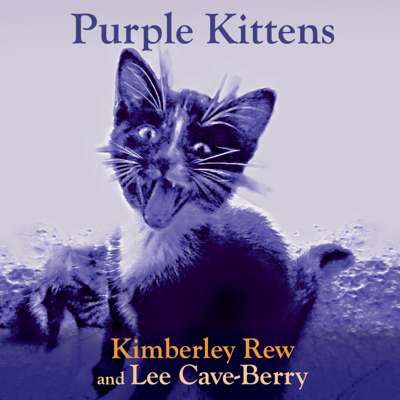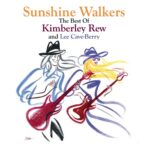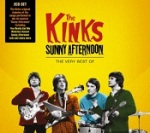
My first proper exposure to the work of Kimberley Rew was when I reviewed the retrospective, “Sunshine Walkers”, in 2020. There’s a theme running through that collection and “Purple Kittens” as well; a celebration of Englishness. Not the populist, flag-waving, “Vindaloo”-singing Englishness. Not that at all. It’s real ale at a riverside pub with the sounds of a skittle alley and maybe a Morris side performing. That kind of Englishness; the kind that’s celebrated by songwriters like Roy Harper and Ray Davies. So it’s appropriate that the album’s opener is “Penny the Ragman”.
The song’s a tribute to Kimberley’s late cousin, Penny, who, among other things, looked after the uniforms for a Morris side (a position known as Ragman) and was inspired by conversations at her wake. It’s a pretty good companion piece for The Kinks’ “The Village Green Preservation Society” as a celebration of a vanishing lifestyle. However, there’s a lot more to “Purple Kittens” than nostalgia; both Kimberley Rew (guitars and vocals) and partner Lee Cave-Berry (bass and vocals) are natural songwriters in the Nick Lowe mould, creating great songs out of eternal themes or the most mundane events and situations, even out of one repeated phrase.
Which is exactly what “Raspberry Ripple Ice Cream” does. Against a spiky, punky riff, the only lyrics are the title (apart from a slight culinary diversion into rum and raisin) sung by both Kimberley and Lee, and a bass solo. It’s just a bit of fun, but it’s done really well. “Black Ribbon” is more serious; it’s a rocking tribute to Roger Smith, of the Cambridge band Jack, who died of COVID last year. It was written by his two grandsons (aged six and eight) the ribbon of the title isn’t a mourning accessory, it refers to the band he wore round his Panama hat.
The Soft Boys cover, “Kingdom of Love”, is progressive and psychedelic with Kimberley/Lee harmonies in the chorus that evoke Nancy Sinatra and Lee Hazlewood, while Lee’s “Unsatisfactory Cats” is a whimsical Kirsty MacColl-tinted exploration of cat behaviour that cat owners/servants will identify with – I certainly did. “Wrong Song” uses the musician’s lot as a metaphor for our daily lives; live performance is a one-off thing and any mistakes are part of your history. You only get one try and you can’t fix it or remix it. There’s also a reference running through the song to Paul Simon’s “50 Ways to Leave your Lover”. Finally, “Daytime Night Time”, which closes the album, runs through the mundane cycle of life, from birth to death, in under five minutes (and that includes extended guitar riffing referencing Chuck Berry and Francis Rossi). It’s a joyous celebration of life and rock ‘n’ roll music.
“Purple Kittens” won’t be troubling the national album charts, but that won’t keep Kimberley Rew and Lee Cave-Berry awake at night. They make albums and play live for the sheer joy of it; that’s what they do and that in itself is worth celebrating. “Purple Kittens” is twelve songs celebrating lives, ways of life and sometimes just cats and ice cream, created and crafted with skill and joy, and a real love for this country. I’ll take that, thank you very much.
“Purple Kittens” is out now on KL Recording (KKL016).
Here’s the video for “Wrong Song”:
 I have a huge admiration for great songwriters; crafting songs that perfectly convey little slices of life or eternal truths without knowing whether the song will reach half a dozen or millions of people or whether it will hibernate for years and emerge as a shiny (and profitable) hit. Nick Lowe was virtually potless after having a string of hits in the late seventies/early eighties when “(What’s So Funny ‘Bout) Peace, Love and Understanding?” appeared on the soundtrack of “The Bodyguard” as a Curtis Stigers cover in 1992. Kimberley Rew’s career took a slightly different trajectory; as a member of Katrina and the Waves, after several years grinding around Air Force bases and Canadian Clubs, he wrote the massive hit “Walking on Sunshine” and Eurovision winner “Love Shine a Light”, and The Bangles had a minor hit with a cover of his song “Going Down to Liverpool”.
I have a huge admiration for great songwriters; crafting songs that perfectly convey little slices of life or eternal truths without knowing whether the song will reach half a dozen or millions of people or whether it will hibernate for years and emerge as a shiny (and profitable) hit. Nick Lowe was virtually potless after having a string of hits in the late seventies/early eighties when “(What’s So Funny ‘Bout) Peace, Love and Understanding?” appeared on the soundtrack of “The Bodyguard” as a Curtis Stigers cover in 1992. Kimberley Rew’s career took a slightly different trajectory; as a member of Katrina and the Waves, after several years grinding around Air Force bases and Canadian Clubs, he wrote the massive hit “Walking on Sunshine” and Eurovision winner “Love Shine a Light”, and The Bangles had a minor hit with a cover of his song “Going Down to Liverpool”.
After Katrina’s departure in 1999, Kimberley carried on writing and recording with his partner and bass player Lee Cave-Berry. The songs were still superb, but weren’t troubling the charts; this is the period covered by the twenty-one (count them, twenty-one) songs on “Sunshine Walkers”.
Kimberley Rew is a very English lyricist, in the same vein as Ray Davies, Nick Lowe, Chris Difford and Billy Bragg; the songs couldn’t come from another country; there’s a self-deprecation and irony that you don’t find anywhere else. The other thing he has in common with these writers is that they can all conjure great songs out of the most prosaic situations: Chris Difford wrote the lyrics for the Squeeze classic, “Tempted”, on a journey to Heathrow.
And so it goes, on the album’s first song, “The Dog Song”, inspired by seeing dogs on an obstacle course for TV entertainment, is a romp through Chuck Berry territory with humorous lyrics, clever rhymes and perfect harmonies. It gets the album off to a flying start and sets the tone for a bunch of songs covering various musical styles and even a couple of those songwriters’ favourites for occasions that recur annually, “All I Want is You for Christmas” and “Happy Anniversary”.
Of the remaining dozen and a half songs, there’s absolutely no filler and several that push all of my buttons, mainly the quintessentially English ones. “Bloody Old England” is Billy Bragg meets Victor Meldrew homesickness for this grey old country set to a skiffle beat, while the national pride and clever rhymes of “English Road” wouldn’t have sounded out of place on an eighties Rockpile album. And let’s not forget “Backing Singer Blues”; I’m not a great fan of the humorous song, but this one actually works. It slightly exaggerates a situation everyone in the business can identify with, and it’s catchy as all hell.
It’s not often that an album can grab my butterfly attention span for twenty-one songs, but “Sunshine Walkers” did it; Kimberley Rew is one of our national treasures whose talents deserve much more exposure.
“Sunshine Walkers” is out now on KL Recording (KL013).
 You’re probably asking the very same question that I asked; what’s the point of another Kinks Kompilation? There are hundreds (of varying quality) out there already, so why would we need another one? The inner cynic says that it’s the run-up to Christmas and it’s a handy present for older relatives (the ones who still own CD players), but that’s a bit unfair because there is at least a rationale behind this release, and that’s a tie-in with the incredibly successful musical “Sunny Afternoon”, which is still running in the West End (go and see it if you get the chance; it’s great fun).
You’re probably asking the very same question that I asked; what’s the point of another Kinks Kompilation? There are hundreds (of varying quality) out there already, so why would we need another one? The inner cynic says that it’s the run-up to Christmas and it’s a handy present for older relatives (the ones who still own CD players), but that’s a bit unfair because there is at least a rationale behind this release, and that’s a tie-in with the incredibly successful musical “Sunny Afternoon”, which is still running in the West End (go and see it if you get the chance; it’s great fun).
This track listing of the compilation imitates the running order of the stage show until partway through the second disc, where things start to get a little unfocussed. There’s a section of ten songs which have been chosen by Ray Davies to add to the selection, followed by some interview snippets and the obligatory BBC sessions; it’s a bit of a mixed bag really.
The idea of following the show’s running order demonstrates the development of The Kinks and Ray Davies’ songwriting. The first three songs are completely forgettable sub-Merseybeat, and it’s not until the music hall-influenced “Denmark Street” that the Kinks truly original and particularly English character emerges, starting a run of twenty-five truly great songs any real music fan should have in their collection.
The ten songs chosen by Ray Davies come from a variety of sources including the albums “Arthur”, “Kinda Kinks”, “Are the Village Green Preservation Society” and even the soundtrack for the film “Percy”; they cover the period 1965 to 1972 and give an indication of the breadth of Ray Davies’ songwriting and the fact that there’s a lot of very good Kinks material out there that most people haven’t heard. The interview clips are fairly standard innocuous stuff used to introduce BBC recordings of “You Really Got Me”, “Tired of Waiting for You” and the Dave Davies classic, “Death of a Clown”.
The overall impression of this package is that someone saw an opportunity to tie in with the stage show but wanted to make it a double CD package without having enough material for two discs. If you don’t own any Kinks albums, this isn’t a bad introduction but it’s a little haphazard once you get past “Lola” on side two.
Out now on Sanctuary Records (KINKSTVCD001).
 I know I probably use this phrase far too often, but this really is something that’s a little bit different and it’s difficult to know where to start. Debi Doss is from St Louis and came to the UK in the 70s as a live music photographer (and a very good one at that) but somehow ended up working as a backing vocalist for her childhood heroes, The Kinks, which led to around ten years of working as a live and session singer for a list of bands that’s way too long for this piece. She even did the female vocal on “Video Killed the Radio Star” and appeared in the video (the first ever shown on MTV USA). All of which helps to explain most of the track listing on the EP.
I know I probably use this phrase far too often, but this really is something that’s a little bit different and it’s difficult to know where to start. Debi Doss is from St Louis and came to the UK in the 70s as a live music photographer (and a very good one at that) but somehow ended up working as a backing vocalist for her childhood heroes, The Kinks, which led to around ten years of working as a live and session singer for a list of bands that’s way too long for this piece. She even did the female vocal on “Video Killed the Radio Star” and appeared in the video (the first ever shown on MTV USA). All of which helps to explain most of the track listing on the EP.
“Video… ” is a mainly acoustic guitar-backed version of the Buggles hit with multi-tracked vocals on the chorus and some subtle electric guitar and handclaps in the bridge; this version proves that it was a great song without the big Buggles production. We all know that “Waterloo Sunset” is a great song, so it’s interesting to hear a version where the intro is acoustic and finger-picked, with the falling chromatic bassline picked out on a six-string at a much slower tempo than the classic Kinks version. The electric comes in on the bridge again for emphasis before dropping back into the acoustic backing and the vocal’s powerful but controlled. And I’ve just realised that Dzal Martin, who I loved in No Dice way back when is the guitar player. “Nothing Lasts Forever”, from The Kinks musical “Preservation” is styled very much like the Kinks original but without the Ray Davies vocal and it works pretty well. “Je Chante” (“I Sing”) is a Debi Doss original written in French and delivered with some nice Gallic cello underneath the vocal; it’s lightweight but pretty and takes to the last track on the EP.
“Fly High – Part 1” is a fragment and, I suspect, the catalyst for the release of this EP. It’s a tribute to her nephew, Scotty, who drowned in Big River, St Louis, in June 2014. It’s a mantra with keyboards, xylophone and guitar leading into a coda which feels like a stairway to the heavens and is completed with a xylophone “Twinkle, Twinkle, Little Star” motif. Short, but poignant. This EP is well worth a listen, but there’s an awful lot more to Debi Doss than the music. If you were into music in the 70s, then you really need to check out the images on her website.
The “Debi Does” EP is out on November 24.


